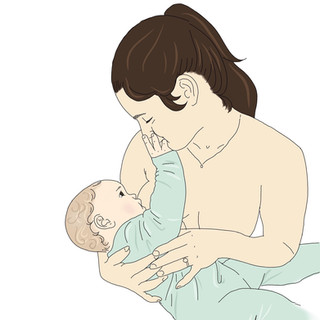Breast feeding
- erinbetterbirth

- May 8, 2020
- 2 min read
Do you plan to breast feed after birth?
Breast feeding has many many benefits for both you and baby. For baby, breast feeding provides them with antibodies to boost baby’s immune system and reduces chance of infection, stem cells which develop baby’s brain and internal organs, reduced chance of sudden infant death syndrome (SIDS), childhood leukaemia, obesity and cardiovascular disease in adulthood to name just a few. For you, breast feeding lowers your risk of breast cancer, ovarian cancer, osteoporosis (weak bones), cardiovascular disease and obesity. It also encourages bonding between you and baby, and in the early days can help with regulating baby’s heart rate, breathing and temperature combined with skin to skin contact.
So with so many benefits, why does the UK have one of the lowest rates of breast feeding in the world, and what can you do to maximise the chance of successful breast feeding?
1. Successful breast feeding starts during labour. Having an undisturbed and natural birth, which promotes the production of birth hormones, particularly prolactin, will encourage milk production and bonding. With the medicalisation of birth, and the tendency to birth in hospital settings which are not conducive to a natural, hormone filled labour, many women struggle in the early stages of breast feeding. Pain relief and artificial hormones all hinder breast feeding hormones and milk production.
2. Having an undisturbed post partum period, where you can focus on just you and baby, get lots of skin to skin, rest and peace, is also vital in successful breast feeding. Our obsession to “get back on our feet and back to normal” post birth is damaging our chances at successfully breast feeding, and women should instead be supported to rest and recover as much as possible after birth.
3. Getting support and knowing where to find it is essential. Undiagnosed tongue ties, cracked and painful nipples, problems with getting baby latched, and misinformation about timing of feeds and whether baby is “getting enough” all damage a woman and baby’s chances of breast feeding in the early days. Find your local breast feeding cafe. Make use of the La Leche league 24 helpline. If you suspect a tongue tie, get it checked ASAP by a registered breast feeding counsellor. Get your information from reliable sources, such as kellymom.com, and don’t buy in to damaging information about timing feeds and schedules.
Breastfeeding can be amazing and a wonderful bonding experience, but it can be tricky to begin with for some women, and requires support from all who a woman comes in to contact with. Partners, grandparents and extended family and friends all have a part to play in helping a woman to succeed.
Did you breast feed? How long did you breast feed for? What would your biggest piece of advice be?




Comments